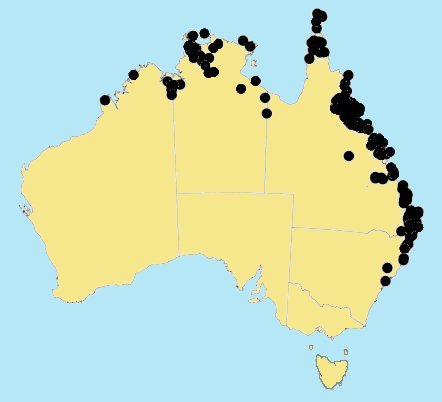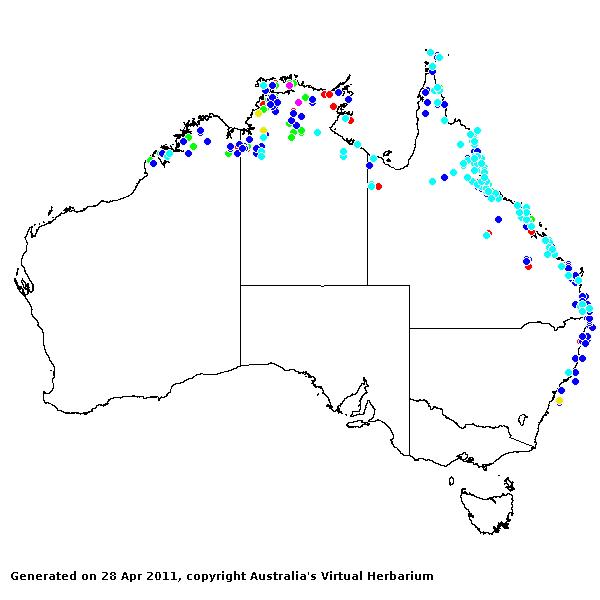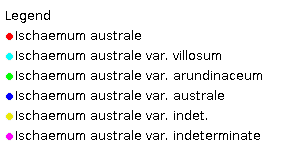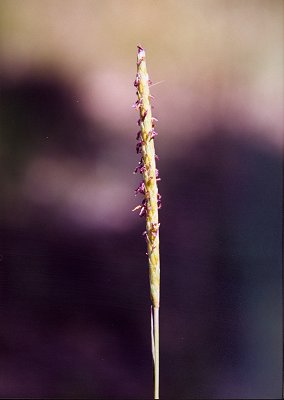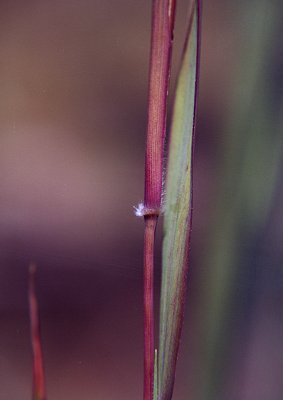Ischaemum australe R. Br. Prodr.
205 (1810).
Classification. (GPWG
2001) : Subfamily Panicoideae. Andropogoneae.
Type of Basionym or
Protologue Information: (J.) apud Portum Jackson, inclusis ripis aestuarii
Hunter's River vel Coal
River,.
Key references
(books and floras): [1810]. R.Brown, Prodromus (205 as I.
villosum, I. asutrale), [1878] G.Bentham, Flora Australiensis 7 (519
as Ischaemum arundinaceum, Ischaemum australe), [1952]
C.A.Gardner, Flora of Western Australia 1 Gramineae (298 as I.
arundinaceum & 300), [1969] E.E.Henty, Manual Grasses New
Guinea (116), [2002] D.Sharp & B.K.Simon, AusGrass, Grasses of
Australia, [2008] S.W.L.Jacobs, R.D.B.Walley & D.J.B.Wheeler, Grasses
of New South Wales (285).
Illustrations:
[1984] N.T.Burbidge. rev. S.W.L.Jacobs, Australian Grasses (165), [2008] S.W.L.Jacobs, R.D.B.Whalley
& D.J.B.Wheeler, Grasses of New South Wales, 4th edn (285).
Habit.
Perennial. Rhizomes present, short. Culms erect, 50–150 cm tall, 4–5 -noded.
Mid-culm nodes glabrous or pubescent or bearded. Lateral branches simple or
branched. Leaf-sheaths glabrous on surface. Ligule a fringed membrane, a
ciliolate membrane, 2–3 mm long. Leaf-blades 10–20 cm long, 3–5 mm wide.
Leaf-blade surface glabrous.
Inflorescence.
Inflorescence digitate, with ramose branches. Rhachis fragile at the nodes.
Spikelets.
Spikelets sessile to sessile and pedicelled, 1 in the cluster or 2 in the
cluster. Companion spikelets pedicelled, 0–1 in the cluster. Companion
spikelets developed, male, asymmetrical, 6–7 mm long. Fertile spikelets
2-flowered, the lower floret barren (rarely male), the upper fertile,
comprising 1 basal sterile florets, comprising 1 fertile floret(s), without
rachilla extension, lanceolate, dorsally compressed, 6–7 mm long.
Glumes. Glumes
dissimilar, firmer than fertile lemma. Lower glume oblong, chartaceous, keeled,
2-keeled, winged on keel, winged narrowly. Upper glume lanceolate, chartaceous,
keeled, 1-keeled, winged on keel, 7 -nerved. Florets. Basal sterile
florets 1, male, with palea. Lemma of lower sterile floret membranous, 3
-nerved.
Fertile lemma without
keel. Lemma apex dentate, awned, 1 -awned. Median (principal) awn from a sinus,
8–10 mm long overall. Anthers 3.
Continental
Distribution: Tropical Asia and Australasia.
Australian
Distribution: Western Australia, Northern Territory, Queensland,
New South Wales.
Western
Australia: Gardner.
Northern Territory: Victoria River,
Barkly Tableland. Queensland: Cook,
Darling Downs, Leichhardt, Moreton, North Kennedy, Port Curtis, South Kennedy, Wide Bay.
New South Wales: North
Coast, Central Coast.
Notes.
Coastal districts from
northern N.S.W. through to the eastern Kimberley,
W.A., usually in wet situations. Also tropical Asia.
Infra -specific
taxa: var. australe, var. arundinaceum, var. villosum.
1. Nodes glabrous I. australe var. arundinaceum
Nodes hairy 2
2. Leaves, rachis internodes and pedicels
hairy I. australe var. villosum
Leaves, rachis internodes and pedicels
glabrous I. australe var. australe
